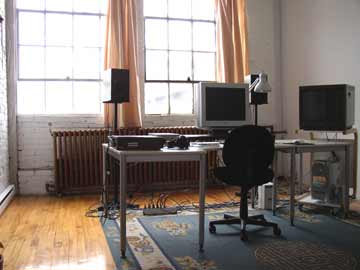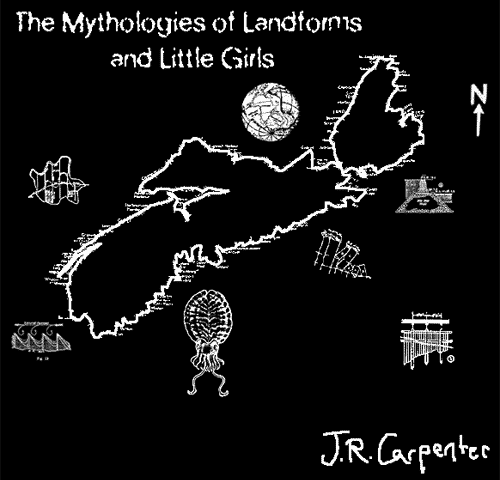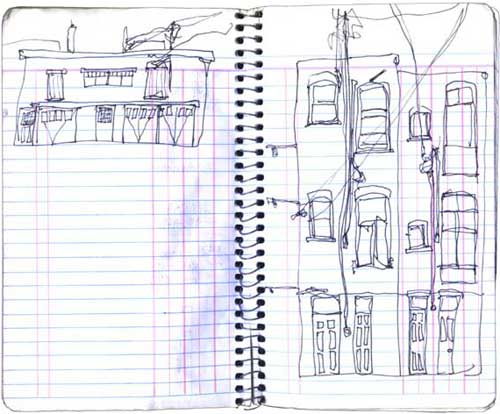MiT5: creativity, ownership and collaboration in the digital age
MIT, Cambridge, MA - April 27-29, 2007
http://web.mit.edu/comm-forum/mit5/

Entre Ville was commissioned in 2006 by OBORO, a Gallery & New Media Lab in Montréal, on the occasion of the 50th anniversary of the Conseil des arts de Montréal.
The commission included a four-week residency at OBORO New Media Lab. This is Studio 3, where I edited the 17 short videos included in Entre Ville.
Entre Ville launched at the Musée des beaux-arts de Montréal on April 27, 2006.
Un 50e anniversaire - En ville et sur l'île
Pierre Vallée - Le Devoir - Édition du samedi 29 et du dimanche 30 avril 2006
Entre is the French word for "between," as in: entre nous, "between us". Ville is the French word for city. Driving into Montréal, all signs point to centre ville, downtown. I live north of downtown in a neighbourhood called Mile End. I work at home. My office window opens onto a jumbled intimacy of back balconies, back yards and back alleys. Daily my dog and I walk through this interior city sniffing for stories.
Entre Ville is a text of walking, and a walk through texts. There are many authors of our neighbourhood. Some are famous, some less so. In this paper I give fictional, poetic and philosophical voices equal credence. And the neighbours get a say.
It's a shared city, after all, this city entre nous.
I grew up in rural Nova Scotia: The Mythologies of Landforms and Little Girls, 1996.
I decided to move to Montréal when I was twelve. I read all the English Montréal authors I could find, oblivious to Québecois culture or politics.
"I was writing poetry and breathing poetry and talking poetry and nothing else had any reality."
Irving Layton, Waiting for the Messiah, 1985
I pondered the nude girl in Leonard Cohen's 1958 poem Snow Is Falling:
Ideas of "place" have long figured prominently in my writing and web art projects:
The Cape, 2005
How I Loved the Broken Things of Rome, 2005
The Cabot Plains Haiku, 2003
The Orchard of Innumerable Plans, 1999
The Mythologies of Landforms and Little Girls, 1996
Entre Ville is my first major piece about Montréal. It was a long time in the making.
I sketched the user interface in 1992, while apartment hunting in the Mile End.
I spent the next fifteen years learning the vocabulary of the neighbourhood. I don't mean French, English, Italian, Greek, Portuguese, Yiddish or any of the other languages spoken in the Mile End. I refer rather to the cumulative vocabulary of neighbourhood: the aural, audio, visual, spatial, tactile, aromatic and climatic vocabulary of community.
I have attempted to present Entre Ville in this vernacular. To tell it like it is. Ours is not the nicest alley in the neighbourhood, but it's not the worst one either. Kitchen gardens and garbage heaps coexist with wildflowers, dog shit, graffiti and grape vines. Cooking smells and laundry lines crisscross the alleyway one sentence at a time.
How does one learn the language of all this? One studies, of course.

Summer long conversations echo across the alleyway
in call-and-answer strophe / antistrophe,
clothesline curtains reel in and out between the acts.
Don't be fooled. I have poetic ideas about neighbourhood, not romantic ones.
Entre Ville is hot, loud, crowded and dirty; I am rural, solitary and misanthropic.
Writing about my more trying neighbours has given me a soft spot for them though.
Two months after the launch of Entre Ville the old Greek lady next door was evicted from her apartment of 23 years; we watched the discarded detritus of her life accumulate in the alleyway. Entre Ville has become a document of gentrification and its erasure.
Mile End is changing. We could be next.
I write about my neighbours acutely aware that I write from amongst them. Gossip is rampant on our street. Voices carry. Word gets around, especially online. Occasionally the neighbourhood writes me an email. Like this one:
 Whatever I might say about multiplicity, Entre Ville privileges a pedestrian point of view. In Wanderlust: A History of Walking, Rebecca Solnit likens walking to writing: "The walking body can be traced in the places it has made; paths, parks, and sidewalks are traces of the acting out of imagination and desire". In The practice of Everyday Life Michel de Certeau suggests that the "ordinary practitioners of the city" cannot read this writing: "They are walkers… whose bodies follow the thicks and thins of an urban "text" they write without being able to read… unrecognized poems…". Perhaps if de Certeau lived in the neighbourhood he wrote that about he'd have seen things differently. He claims that: "To walk is to lack a place". My dog and I humbly disagree. For eight-and-a-half years we've been walking up and down our back alleyway.
Whatever I might say about multiplicity, Entre Ville privileges a pedestrian point of view. In Wanderlust: A History of Walking, Rebecca Solnit likens walking to writing: "The walking body can be traced in the places it has made; paths, parks, and sidewalks are traces of the acting out of imagination and desire". In The practice of Everyday Life Michel de Certeau suggests that the "ordinary practitioners of the city" cannot read this writing: "They are walkers… whose bodies follow the thicks and thins of an urban "text" they write without being able to read… unrecognized poems…". Perhaps if de Certeau lived in the neighbourhood he wrote that about he'd have seen things differently. He claims that: "To walk is to lack a place". My dog and I humbly disagree. For eight-and-a-half years we've been walking up and down our back alleyway.

It's distributed in Montréal at readings and events around town, and through the DISTROBORO, cigarette machines re-purposed to sell cigarette-pack-sized art for two dollars.
MIT, Cambridge, MA - April 27-29, 2007
http://web.mit.edu/comm-forum/mit5/

Entre Ville was commissioned in 2006 by OBORO, a Gallery & New Media Lab in Montréal, on the occasion of the 50th anniversary of the Conseil des arts de Montréal.
The commission included a four-week residency at OBORO New Media Lab. This is Studio 3, where I edited the 17 short videos included in Entre Ville.
Entre Ville launched at the Musée des beaux-arts de Montréal on April 27, 2006.
Un 50e anniversaire - En ville et sur l'île
Pierre Vallée - Le Devoir - Édition du samedi 29 et du dimanche 30 avril 2006
Entre is the French word for "between," as in: entre nous, "between us". Ville is the French word for city. Driving into Montréal, all signs point to centre ville, downtown. I live north of downtown in a neighbourhood called Mile End. I work at home. My office window opens onto a jumbled intimacy of back balconies, back yards and back alleys. Daily my dog and I walk through this interior city sniffing for stories.
Entre Ville is a text of walking, and a walk through texts. There are many authors of our neighbourhood. Some are famous, some less so. In this paper I give fictional, poetic and philosophical voices equal credence. And the neighbours get a say.
It's a shared city, after all, this city entre nous.
"Towns are the illusion that things hang together somehow…"Montréal is both literally and figuratively a French-speaking island. It's the second largest city in Canada, yet only 17% of its population claims English as a first language. It's a complicated place, but things hang together somehow... Montréal's been very good to me.
Anne Carson, The Life of Towns, 1995.
I grew up in rural Nova Scotia: The Mythologies of Landforms and Little Girls, 1996.

I decided to move to Montréal when I was twelve. I read all the English Montréal authors I could find, oblivious to Québecois culture or politics.
"I was writing poetry and breathing poetry and talking poetry and nothing else had any reality."
Irving Layton, Waiting for the Messiah, 1985
I pondered the nude girl in Leonard Cohen's 1958 poem Snow Is Falling:
She is eighteen.What was a Montréal language? I was dying to know.
She has straight hair.
She speaks no Montreal language.
"On St. Urbain Street, a head start was all. Our mothers read us stories from Life about pimply astigmatic fourteen-year olds who had already graduated from Harvard or who were confounding the professors at MIT." Mordecai Richler, The Street, 1969.It happens that I now live on Saint-Urbain Street, on the same block Mordecai Richler grew up on. It took me a while, but here I am at MIT.
Ideas of "place" have long figured prominently in my writing and web art projects:
Entre Ville is my first major piece about Montréal. It was a long time in the making.
I sketched the user interface in 1992, while apartment hunting in the Mile End.

I spent the next fifteen years learning the vocabulary of the neighbourhood. I don't mean French, English, Italian, Greek, Portuguese, Yiddish or any of the other languages spoken in the Mile End. I refer rather to the cumulative vocabulary of neighbourhood: the aural, audio, visual, spatial, tactile, aromatic and climatic vocabulary of community.

I have attempted to present Entre Ville in this vernacular. To tell it like it is. Ours is not the nicest alley in the neighbourhood, but it's not the worst one either. Kitchen gardens and garbage heaps coexist with wildflowers, dog shit, graffiti and grape vines. Cooking smells and laundry lines crisscross the alleyway one sentence at a time.
How does one learn the language of all this? One studies, of course.
"I am a scholar of towns… To explain what I do is simple enough. A scholar is someone who takes a position. From which position, certain lines become visible. You will at first think I am painting the lines myself; it's not so. I merely know where to stand to see the lines that are there."From the position of my office window I can't help but learn the lives of my most immediate neighbours. Their voices barge into the poem Saint-Urbain Street Heat, which first published in the London UK based online Journal Nth Position in August 2005:
Anne Carson, The Life of Towns, 1995.
In an intimacyThis is not quite a first person point of view. Our proximity disallows singularity. We go about our business. Nous autres. We're poor. It's hot. No one has air conditioning. This is common, a shared experience.
born of proximity
the old Greek lady and I
go about our business.
Foul-mouthed for seventy,
her first-floor curses fill
my second-floor apartment;
her constant commentary
punctuates my day.
All the kitchenMany people who have never been to Montréal in the summer refuse to believe how hot it gets. Our literature is drenched in the sweat of our summers.
back doors stand open -
sticky arms flung open -
imploring, in a heat-rashed prayer:
Deliver us unto
the many gods
of Mile End.
"The sky was a fever and there was no saying how long a day would last or what shape the heat would assume by night. There were the usual heat rumours about… women swooning in the streets and babies being born prematurely. …old men sipped lemon tea on the balconies and told tales about the pogroms of the czar." Mordecai Richler, Son of a Smaller Hero, 1955Most Montréal apartments have two balconies, one on the street front and one opening onto the alley. A common ground in our oft-divided city, an extra room, a slim slice of outdoors for inner city apartment dwellers, the balcony becomes a stage upon which dramas unfold, from which orations issue.
JOHNNY: "Whew, hot. You going anywhere this summer?"Balconville is a Franglais word, Montréal slang. In French, a "balcony" is a galerie. Like the visual art gallery, a site charged with potential. In this entrespace the private unfolds in public display.
PAQUETTE: "Moi? Balconville."
JOHNNY: "Yeah. Miami Beach."
David Fernario, Balconville, 1980
"One struggles without voice to forge a voice the way a wrought-iron balcony suddenly gives access to the city's far-off sounds..." Nicole Brossard, French Kiss, 1986

Summer long conversations echo across the alleyway
in call-and-answer strophe / antistrophe,
clothesline curtains reel in and out between the acts.
Don't be fooled. I have poetic ideas about neighbourhood, not romantic ones.
Entre Ville is hot, loud, crowded and dirty; I am rural, solitary and misanthropic.
Writing about my more trying neighbours has given me a soft spot for them though.
Two months after the launch of Entre Ville the old Greek lady next door was evicted from her apartment of 23 years; we watched the discarded detritus of her life accumulate in the alleyway. Entre Ville has become a document of gentrification and its erasure.
Mile End is changing. We could be next.
I write about my neighbours acutely aware that I write from amongst them. Gossip is rampant on our street. Voices carry. Word gets around, especially online. Occasionally the neighbourhood writes me an email. Like this one:
"I was sitting at my mom's (no internet at home yet) eating millet pie with ketchup (a bit too dry). I clicked on Wannatakepicture. There was my mom's house. There was the window i was staring out of (blankly) moments before. And there was the voice of Mr. G, the Portuguese landlord. Nice garden. Mom was chuffed." J. M.How one reads or writes the texts and textures of neighbourhood depends entirely on one's point of view. Do you live here? Are you a parent or a child, a cat or a dog, a bicyclist or in a SUV? Word on the street is, novelist Heather O'Neill lives a few doors down from me. Her 2006 novel, Lullabies for Little Criminals, offers a disconsolate twelve-year-old point of view:
"The back alley… looked the way the world would look if a child had built it… There was a toy bucket with rocks in it and a sled that had been left behind from a day when there had been snow on the ground. You'd think that these houses were being blown apart by the wind, the way that pieces of them were lying about. Not one of them would be a match for the Big Bad Wolf."
 Whatever I might say about multiplicity, Entre Ville privileges a pedestrian point of view. In Wanderlust: A History of Walking, Rebecca Solnit likens walking to writing: "The walking body can be traced in the places it has made; paths, parks, and sidewalks are traces of the acting out of imagination and desire". In The practice of Everyday Life Michel de Certeau suggests that the "ordinary practitioners of the city" cannot read this writing: "They are walkers… whose bodies follow the thicks and thins of an urban "text" they write without being able to read… unrecognized poems…". Perhaps if de Certeau lived in the neighbourhood he wrote that about he'd have seen things differently. He claims that: "To walk is to lack a place". My dog and I humbly disagree. For eight-and-a-half years we've been walking up and down our back alleyway.
Whatever I might say about multiplicity, Entre Ville privileges a pedestrian point of view. In Wanderlust: A History of Walking, Rebecca Solnit likens walking to writing: "The walking body can be traced in the places it has made; paths, parks, and sidewalks are traces of the acting out of imagination and desire". In The practice of Everyday Life Michel de Certeau suggests that the "ordinary practitioners of the city" cannot read this writing: "They are walkers… whose bodies follow the thicks and thins of an urban "text" they write without being able to read… unrecognized poems…". Perhaps if de Certeau lived in the neighbourhood he wrote that about he'd have seen things differently. He claims that: "To walk is to lack a place". My dog and I humbly disagree. For eight-and-a-half years we've been walking up and down our back alleyway. That's eight-and-a-half years of up and eight-and-a-half years of down.We walk like we own the place. We walk to write the place, to collect, collate and annotate the multitude of texts generated by the occupants of Entre Ville. We try to read between the alleyway's long lines of peeling-paint fences spray painted with bright abstractions and draped with trailing vines.
Nine thousand three hundred laps of toenails clicking on cracked concrete.
Trail zigzagging, long tail wagging, long tongue lolling, dog tags clacking.
Ears open, eyes darting, nose to the ground.
J. R. Carpenter, Sniffing for Stories, 2006
"Writing that feeds on zigs and zags … roams the streets, traces its course through them… narration of the inner odyssey in terms of Montréal's geography, its contours and harsh angles, sidestreets and lanes… from the heart of the city to the epicentre of oneself, the target and motive source."Entre Ville is a poem. In its web iteration, verses scroll the alleyway, popup in windows - altered - and then disappear. The user interface is an image of a blank book upon which a few lines of city have been hastily sketched. Roll the mouse over windows and doors as you might scan your eyes over a cityscape. Occasionally you will catch a glimpse of an interior.
Nicole Brossard, French Kiss, 1986
"It also happens that … when you least expect it, you see a crack open and a different city appear. Then, an instant later, it has already vanished." Italo Calvino, Invisible Cities, 1972However accessible the web may be, I also wanted a book iteration of Entre Ville. In the early days of the Internet, alarmists and advocates alike proclaimed that digital media heralded the end of the book.
"The question of the book could only be opened if the book was closed… only in the book, coming back to it unceasingly, drawing all our resources from it, could we indefinitely designate the writing beyond the book." Jacques Derrida, Writing and Difference, 1976The Entre Ville mini-book approaches media convergence. Through photocopies and staples it reprints the poem, republishes the URL, and recycles images cut from children's textbooks salvaged from the old Greek lady's moving day garbage.

It's distributed in Montréal at readings and events around town, and through the DISTROBORO, cigarette machines re-purposed to sell cigarette-pack-sized art for two dollars.
| I invite you to visit Entre Ville. If you're in the neighbourhood, drop me a line. Merci! J. R. Carpenter, April 27, 2007. |
J. R. CARPENTER OBORO New Media Lab
|